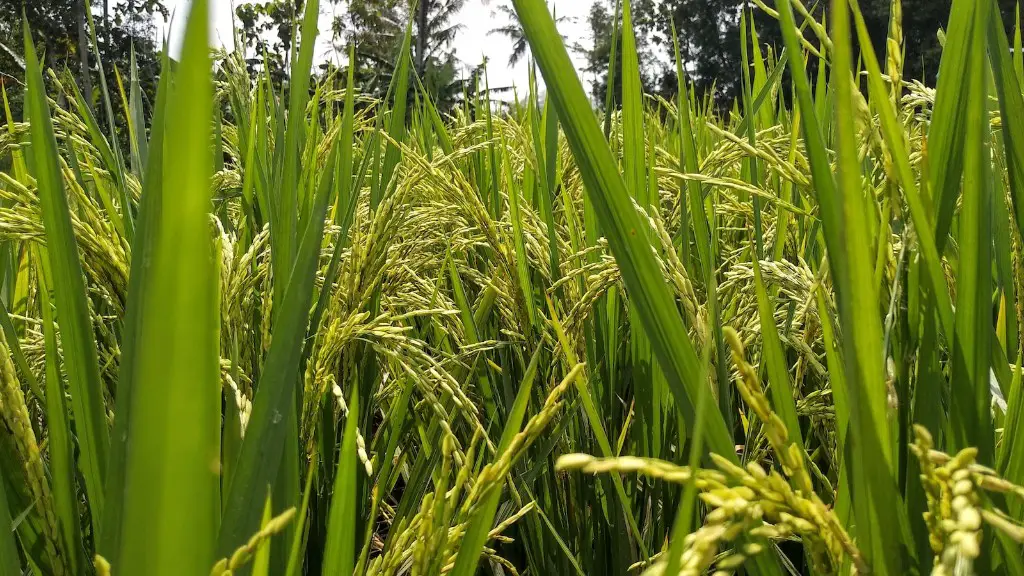The average salary of a person working in agriculture is difficult to determine given the wide range of job titles, experience levels, and qualifications. That said, it is possible to estimate the median annual salary of full-time agriculture workers in the United States. According to the latest data provided by the Bureau of Labor Statistics, the median annual salary for full-time agriculture workers in 2020 was $34,020. This number is higher than the median salary for all occupations, which was $39,810.
In addition to occupation and experience level, salary levels in the agriculture industry also depend on geographic location. According to the latest census data, the five states with the highest median salary for full-time agricultural workers were Wyoming, with an average salary of $53,470; California, with an average salary of $51,720; Oregon, with an average salary of $48,780; New Mexico, with an average salary of $48,270; and Idaho, with an average salary of $41,320.
It should also be noted that the salaries of agricultural workers vary significantly depending on the type of work they do. For example, animal caretakers and farmhands typically earn less than plant and soil specialists, while those working in agriculture sales, finance, and management tend to earn more. It is therefore important to consider the type of work being done in order to better determine an individual’s salary level.
Finally, it is important to remember that salary levels in the agriculture industry are affected by the changing dynamics of the industry. For instance, due to global economic trends, the demand for specific crops or agricultural products may fluctuate, which in turn affects job opportunities and wages. Additionally, advances in technology, such as artificial intelligence (AI) and robotics, have led to changes in the structure of the agriculture industry and have altered the skill sets required to work in the field.
Agricultural Job Opportunities
Recent trends in the agricultural industry have created new job opportunities in a variety of professions. For instance, farmers and ranchers have needed to recruit employees with skills in biotechnology, genetic engineering, and crop sciences in order to develop new crop varieties or understand the effects of climate change on their land. Other jobs in the agricultural industry include food science and engineering, agricultural marketing, public policy, and environmental management.
Given the range of employment options, those considering a career in the agricultural sector may need to develop specialized knowledge and skills in order to be competitive in their chosen profession. For example, agricultural jobs such as crop engineers require a background in engineering, and those working in public policy need to understand the complexities of the legislation and laws that govern the sector.
Those interested in pursuing a career in agriculture can also gain valuable experience and knowledge through internships, apprenticeships, and even volunteer work. These types of opportunities can provide individuals with a better understanding of the industry and the skills and knowledge needed to remain competitive. Additionally, internships and other types of paid education placements can provide a valuable insight into potential career options and salary expectations.
Farming and Ranching
Farming and ranching, the two most common forms of agriculture, are integral components of the industry and require specialized knowledge, skill, and training to succeed. Those interested in pursuing a career in farming or ranching need to learn about the intricacies of land management, livestock knowledge, business management, and equipment maintenance. This type of knowledge and skill is not only necessary for successful farming or ranching, but also for those who wish to pursue careers in one of the many sub-sectors of agriculture.
In addition to the knowledge and skill required to work in farming or ranching, salary expectations tend to vary greatly. According to the latest Bureau of Labor Statistics, the median salary for a full-time farmer or rancher in 2020 was $33,220. This is significantly lower than the overall median salary for all occupations in the United States, which was $39,810. It should also be noted that salary levels for those in the farming and ranching sector can vary greatly depending on the size and type of farm or ranch, climate and weather conditions, and crop output.
Farming and ranching can also be capital intensive professions, requiring significant investments in land, equipment, and livestock. This can create financial pressures for farmers and ranchers, as well as uncertainties about job opportunities and salary in the long term. Therefore, anyone considering a career in animal or crop production must analyze and prepare for potential risks, such as market cycles and changing consumer preferences.
Horticulture, Landscaping and Forestry
Horticulture, landscaping, and forestry are other common occupations within the agricultural industry. These professions involve cultivating plants, managing and maintaining woodlands, managing nurseries, and providing landscape services. Salary levels in these industries vary widely depending on the type of work being done, but are typically more competitive than salaries in farming or ranching.
Horticulture and landscaping professionals, in particular, tend to have higher salary levels than those in the farming and ranching sector. For example, the median salary for a full-time horticultural or landscaping professional in 2020 was $40,480, compared to the median salary for all occupations in the United States, which was $39,810. On the other hand, forestry professionals tend to have lower salary levels compared to those in horticultural and landscaping jobs.
As with other agricultural occupations, horticultural, landscaping, and forestry jobs require specialized knowledge, skill, and training. Those interested in pursuing careers in these fields can benefit from obtaining specific credentials, such as certification in sustainable horticultural practices or certification in forest management. Additionally, internships, apprenticeships, and other forms of experiential learning can provide individuals with the skills and knowledge needed to succeed in the agriculture industry.
Animal Care
Animal care is another profession in the agricultural industry that requires specialized knowledge, is asset-intensive, and provides stable job opportunities. Those working in animal care must understand the needs of their animals and be able to provide them with proper nutrition, housing, and exercise. Additionally, animal care professionals need to be aware of disease prevention and treatment, as well as remain up to date on the latest animal husbandry practices.
The salary level for those working in animal care varies depending on the type of job being done, the type of animal being cared for, and the geographic location. The median annual salary for full-time animal care workers in the United States was estimated to be $30,640 in 2020. The five states with the highest median annual salary for full-time animal care workers in 2020 were Wyoming, with an average salary of $45,730; California, with an average salary of $44,110; Montana, with an average salary of $42,530; South Dakota, with an average salary of $40,870; and Alaska, with an average salary of $40,490.
For those interested in working in animal care, pursuing a degree or professional certification in veterinary medicine, animal nutrition, and animal behavior can be beneficial. Additionally, volunteering or working at a veterinary office, animal shelter, or animal farm can provide individuals with valuable experience in the industry.
Agricultural Education and Entrepreneurship
Finally, agricultural education and entrepreneurship are also career paths available in the agricultural industry. The median annual salary of a full-time agricultural educator in 2020 was estimated to be $37,800. Those working in agricultural education and entrepreneurship need to have specialized knowledge in agricultural practices, but also business and marketing skills in order to develop successful agricultural businesses.
In addition to their specialized knowledge and skills, individuals working in agricultural education and entrepreneurship need to be aware of the local and global trends in the industry. For example, global economic shifts, changing consumer preferences, and advances in technology can affect the success of a business venture. Therefore, those working in agricultural education and entrepreneurship must understand the dynamics of the industry in order to remain competitive.
In order to remain competitive, agricultural educators and entrepreneurs also need to stay up to date on the latest trends and research in their field. This can be done through attending professional conferences, reading industry publications, and connecting with other agricultural professionals on social media or other platforms. Additionally, engaging with scientific organizations and non-profits can provide individuals with valuable insight into the industry and cutting-edge practices.




